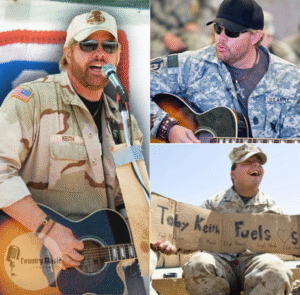Over the course of his career, country music legend Toby Keith performed for more than 250,000 American troops stationed in conflict zones around the world. While fans and fellow citizens have long appreciated his patriotism and unwavering support for the military, only now are details emerging about the incredible risks he took to bring music, comfort, and a taste of home to those serving far from their families.
Keith, who joined multiple USO (United Service Organizations) tours over two decades, traveled deep into combat zones including Iraq, Afghanistan, and other undisclosed locations. Often flying into hostile territory under the cover of darkness aboard military aircraft, Keith refused to stay behind in safer zones or limit his performances to secure bases. He insisted on going where morale was lowest—forward operating bases, remote camps, and even outposts reachable only by helicopter.
Those close to him have shared stories of how Keith would shrug off warnings about enemy threats, IEDs, and rocket attacks. “He wasn’t doing it for headlines,” said one USO official. “He genuinely wanted to let those troops know they weren’t forgotten. He always said, ‘If they’re brave enough to be out there, then I can be brave enough to sing for them.’”
Fellow performers and crew members recall Keith sleeping in tents, eating MREs (Meals Ready to Eat), and performing in 120-degree heat, refusing special treatment. He would often stay long after shows to sign autographs, take photos, and listen to stories from soldiers, many of whom later described those moments as deeply meaningful.
One Army sergeant remembered Keith singing under mortar fire. “The alarms went off, and we all hit the dirt—but not Toby. He kept playing, right there on the back of a Humvee. We laughed, we cried… It was like he gave us permission to feel human again.”
Keith’s commitment extended beyond performances. He often flew in with donations of gear and supplies—guitars, sports equipment, hygiene kits—collected with the help of fans and sponsors back home. He also personally funded the travel expenses of some of his band and crew when budgets were tight, ensuring the show could go on.
Despite the lack of mainstream media coverage at the time, videos and testimonials from service members have begun to surface, painting a fuller picture of his devotion. Many veterans credit those concerts with helping them push through difficult deployments. “He gave us a piece of America,” one Marine wrote in a letter. “He reminded us why we were doing what we were doing.”
For Toby Keith, it wasn’t about politics or recognition. It was about gratitude. “Those men and women give everything,” he once said in an interview. “They deserve more than a thank you—they deserve our time, our respect, our presence.”
Though his legacy includes chart-topping hits and awards, it is perhaps these unpublicized acts of bravery and compassion that resonate most deeply with those who served. Keith never sought medals or ceremonies—just a chance to make a difference, one song at a time.


